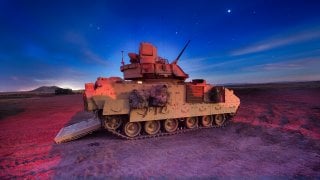Ukraine’s Bold Kursk Offensive: A Turning Point or Bargaining Chip?
For the Ukrainian president, the Kursk offensive is the first step toward a possible end-game more favorable to Ukraine. With all the unknowns, it is unclear whether his gambit will succeed.
Over a month ago, Kyiv surprised the world when it attacked across the border into the Kursk region of Russia. Ukraine reportedly retains control of approximately 100 villages. The incursion allowed Kyiv to demonstrate to its Western supporters and Moscow that it is capable of bold initiatives and revealed how unprepared Russia was for any such attack.
Ukrainian President Volodymyr Zelenskyy stated that Kyiv was not interested in holding Russian territory permanently, but that the incursion was designed to force Russia to negotiate. Meanwhile, Russian president Vladimir Putin seemingly laughed off the incursion. He stated, "The enemy's goal was to make us nervous and worry and to transfer troops from one sector to another and to stop our offensive in key areas, primarily in the Donbas," but it didn’t work.
In the short-run, the Ukrainian attack has bolstered the morale of Ukrainian forces and changed the narrative for the Ukrainian people, who have endured two-and-a-half years of missiles, drones, and glide bombs. In part, at least, the assault furthered Kyiv’s attempts to dent the average Russian’s sense of invulnerability.
Militarily, Kyiv hoped that the Russians would redeploy at least some of the troops from the Donbas front lines to Kursk. Instead, Moscow maintains its assault toward the crucial rail depot of Pokrovsk, with the city now encircled by the Russian troops.
Kursk Offensive: So What Now?
The Kursk offensive seems to have emboldened Zelenskyy. In addition to drone strikes on Belgorod and oil refineries, Ukraine is carrying out daily drone attacks on targets well within Russia, including the outskirts of Moscow.
Ukraine continues to hold Russian territory, but according to news reports, the Russians have begun a counteroffensive, thus far primarily with inexperienced troops. Only in mid-September did Russia begin redeploying better-trained troops to Kursk. Nonetheless, Zelenskyy claims that Moscow’s Pokrovsk attack has slowed, even as Russia’s relentless attacks on civilian targets and infrastructure continue.
As the surprise of the initial assault wears off, the reality is that not much has changed. Russia still has advantages in manpower, equipment, and ammunition. Ukraine, despite its innovations in drone technology, remains dependent on Western aid, most particularly missiles and ammunition.
Kursk, by itself, cannot alter this dynamic. Yet, it would seem that Zelenskyy calculates that it can be a bargaining chip in some future negotiation process, in which Kursk would be traded for Russian-occupied Ukrainian territory. According to the Ukrainian president, the Kursk incursion is part of a wider peace initiative that he will present to President Joe Biden in the coming weeks. In Zelenskyy’s words, his plan will not end the war but purportedly open a path toward a negotiated settlement.
By the same token, there is an urgency: Most immediately, how long can Ukraine endure the sustained Russian attacks? Will Russia redeploy more, and better-trained, troops from Donbas for the counter-offensive in Kursk? In the long term, Zelenskyy’s hoped-for success depends on whether or not the West lifts restrictions on the use of long-range missiles to attack Russian territory. If the constraints are lifted, how will Moscow respond if Kyiv does attack Russian territory with Western weapons?
Another looming unknown is the result of the upcoming U.S. presidential election. Former President Donald Trump and his running mate JD Vance have promised to end support for Ukraine and force Kyiv to accept major territorial concessions. Democratic nominee and current Vice President Kamala Harris and her running mate Governor Tim Walz have pledged continuing assistance to Ukraine.
There have been reports that the West is pressuring Zelenskyy to consider some kind of compromise. Yet, for the Ukrainian president, the Kursk offensive is the first step toward a possible end-game more favorable to Ukraine. With all the unknowns, it is unclear whether his gambit will succeed.
About the Author:
Carol R. Saivetz is a Senior Fellow in the MIT Security Studies Program. She is also a Research Associate at Harvard’s Davis Center for Russian and Eurasian Studies and the Harvard Ukrainian Research Institute. She is currently teaching Russian Foreign Policy in the Political Science Department at MIT. Her research centers on Russian policy toward the other post-Soviet states and the Middle East.
Image Credit: Creative Commons and/or Shutterstock.


